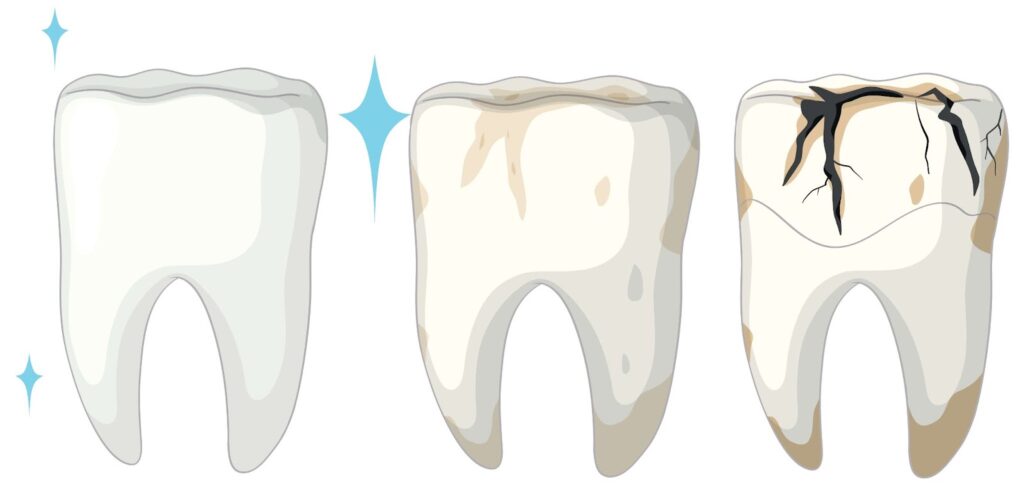
Tooth decay is one of the most common oral health concerns, yet many individuals don’t recognize its earliest signs. Understanding what a cavity feels like can help you take quick action to prevent more serious dental issues. At Dental Artistry in Bend, Oregon, our team believes that patient education is the first step toward a healthier smile, and we’re proud to offer comprehensive family dentistry to care for patients of all ages. In this guide, we’ll explain the physical sensations associated with cavities, early warning signs, treatment options, and how you can prevent them altogether. A cavity is a small hole that forms in your tooth as a result of decay. Cavities develop when bacteria in your mouth feed on sugars and carbohydrates, producing acids that gradually wear away your enamel—the tooth’s protective outer layer. When left untreated, this decay can penetrate deeper layers of the tooth, eventually reaching the pulp, where nerves and blood vessels reside. That’s when pain often becomes unavoidable. Identifying cavities early can make a huge difference in preserving your natural teeth. Many people associate cavities with severe pain, but the reality is more complex. In fact, some cavities present no noticeable symptoms in the early stages. Here are some common signs of tooth decay to watch out for: Early detection is key. At Dental Artistry, we use advanced imaging and diagnostic techniques to catch cavities before they become painful or require invasive procedures. So, what does a cavity feel like in its various stages? In the beginning, a cavity may not cause any pain at all. Some people may notice: Because pain is often absent in the early stage, tooth cavity symptoms can be easily overlooked. This is why routine dental checkups are essential. As the decay progresses through the enamel into the dentin (the softer tissue beneath), you may experience: At this point, the cavity is still treatable with a simple filling, but delaying treatment increases the risk of more severe pain. Once decay reaches the tooth pulp, symptoms become more intense: Dental Artistry specializes in gentle and effective cavity treatment, from tooth-colored fillings to root canal therapy for more advanced cases. Cavity pain can vary significantly based on the location and severity of the decay. Some patients feel discomfort only when they eat, while others report constant pain that keeps them awake at night. If you are experiencing any of these symptoms, the team at Dental Artistry can evaluate the problem using high-resolution digital X-rays and visual exams to recommend the most effective treatment. When you visit Dental Artistry for cavity concerns, our diagnostic process is simple and comfortable: These tools help us identify cavities with precision so we can treat them before they lead to more severe symptoms. Treatment depends on the severity of the decay: At Dental Artistry, we focus on conservative treatments that preserve your natural teeth and restore comfort and function. You can significantly reduce your risk of cavities by: We also offer dental sealants for kids and adults, as well as personalized oral health plans. At Dental Artistry in Bend, Oregon, we provide exceptional cavity care in a comfortable, compassionate environment. Using advanced diagnostics and minimally invasive techniques, our team treats cavities with precision and ease. We also offer gentle sedation and personalized preventive care to support your oral health at every visit. At Dental Artistry in Bend, OR, our skilled team offers comprehensive dental services, including early cavity detection, fillings, cleanings, and preventive care using advanced technology and minimally invasive methods. Whether you're experiencing mild sensitivity or sharp pain, we’ll create a personalized treatment plan to restore your comfort and protect your smile. We’re open daily from 9 AM to 5 PM, including weekends, to make scheduling convenient for you. Ready to prioritize your oral health? Contact Dental Artistry to book an appointment, schedule online, or stop by our Bend office location. From prevention and diagnostics to expert restorative care, we’re here to help you maintain a healthy, pain-free smile. Understanding what a cavity feels like helps you take control of your oral health by recognizing early tooth cavity symptoms. Cavities can range from mild sensitivity to sharp, persistent pain, making early detection crucial. At Dental Artistry, we’re dedicated to identifying signs of tooth decay early and delivering exceptional care to prevent further damage. Yes. If decay develops around the margin of the crown, bacteria can infiltrate and cause decay beneath it. Regular checkups help detect these issues early. Cavity progression varies. Some develop over months, while others take years, depending on oral hygiene, diet, and saliva flow. Once enamel has broken down and a cavity forms, it won’t heal naturally. However, early enamel demineralization may be reversed with fluoride. No. Pain perception differs between individuals, and the location of the cavity also influences symptoms. OTC products may relieve symptoms, but they cannot treat the cavity itself. Only a dental professional can remove decay and restore the tooth.What is a Cavity?
Identifying Cavities
So, What Does a Cavity Feel Like?
Early Stage
Moderate Stage
Advanced Stage
Cavity Pain: What to Expect
Common patterns of cavity pain include:
Diagnosis: How Dental Artistry Identifies Cavities

How Dental Artistry Treats Cavities
Preventing Cavities at Home and with Dental Artistry
Why Choose Dental Artistry for Cavity Care?
Say Goodbye to Cavity Pain with Expert Care in Bend, OR
Conclusion

FAQs
Can cavities form under a dental crown?
How fast do cavities grow?
Can a cavity go away on its own?
Does everyone feel cavities the same way?
Can I use over-the-counter products to treat a cavity?
Contact us with any questions or to schedule an appointment. Our caring and dedicated staff can't wait to hear from you!
Schedule Complimentary Consultation